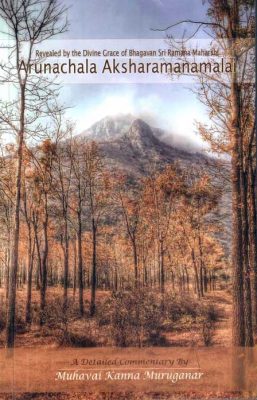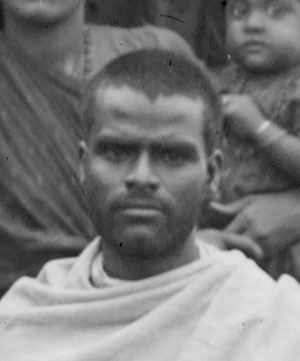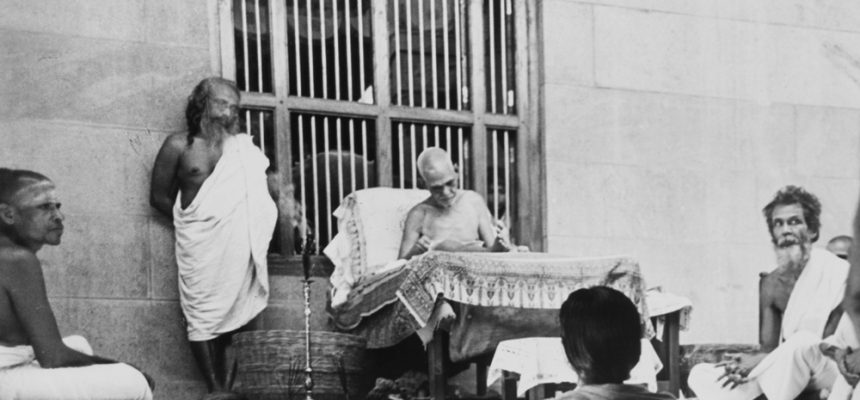Arunachala Aksharamanamalai

Arunachala Aksharamanamalai is the 108-verse poem in praise of Arunachala that Bhagavan composed while he was living in Virupaksha Cave. It belongs to the bridal mysticism genre, expressing the yearning of a devotee for union with the divine. Parts of it are autobiographical, but most of it contains exhortations to Arunachala to take the jiva of the person chanting it and absorb it in himself. Bhagavan noted years later that it was primarily written from the standpoint of a devotee, not from the perspective of the jnani.
Kunju Swami has narrated the circumstances that led to its composition.
… when devotees started staying with Sri Bhagavan in Virupaksha Cave, the food obtained from the sadhu’s choultry was found to be insufficient for everyone. The devotees then decided that they would get their food by begging in town. Each day they would go to town in the late afternoon to beg for and collect food.
Begging for food in this way is called ‘going for bhiksha’. Bhiksha is the food that is offered. Kunju Swami continues:

Later that day, they dined on the bhiksha food back at Virupaksha Cave and any leftovers were used the next morning. Instead of waiting in front of each house and asking for food, which is the traditional way that religious mendicants beg in India, the devotees would walk along each street singing Akshara Malai Vigraha Amasadeeswara, a hymn composed by Adi-Sankara. It was only necessary to beg in the evenings because the food eaten at midday was brought by Echammal, Mudaliar Patti, Kannakammal and others.
When the householders in town heard this Sankara song being sung, they would know that the group was Sri Bhagavan’s devotees. They would then come out of their houses and offer clean, fresh food. However, some local sadhus from the town came to hear about this routine. They started singing the same song and began collecting the ashram’s food before Sri Bhagavan’s devotees had even got to town. Only when Sri Bhagavan’s devotees came singing for bhiksha did the householders realise that they had been deceived by the other sadhus.
Palaniswami, Perumal Swami and some others went and told Sri Bhagavan that if he composed some other songs for their use while going for bhiksha, it would put an end to the problem caused by the other sadhus. They also told him that such songs would help those who offered bhiksha to identify the group. Acting on their suggestion and request, Sri Bhagavan composed Aksharamanamalai, a Tamil poem of 108 verses in praise of Arunachala. The devotees then began to sing it regularly when they went into town for bhiksha. (The Power of the Presence, 2nd edition, pp. 25-27)
Bhagavan would occasionally joke that ‘Aksharamanamalai fed us for many years’. See Day by Day with Bhagavan (9.12.45) for Bhagavan’s own description of how the devotees begged while singing this song.
Here are some excerpts from the book. They begin with some of Muruganar’s explanatory introductory verses, and are followed by his analysis of the meaning of the first three verses.
Prefatory Verse
(Composed by Muruganar, the author of the commentary)
taruṇā ruṇamaṇi kiraṇā valinikar
taruma kṣaramaṇa makiḻmālai
teruṇā ṭiyatiru vaṭiyār terumaral
teḷiyap paruvutal poruḷākak
karuṇā karamuṉi ramaṇā riyaṉuva
kaiyiṉāṟ coliyatu katiyāka
varuṇā calameṉa vakamē yaṟivoṭu
māḻvār civaṉula kāḷvārē.
Paraphrase
The meaning of ‘Akshara Manamalai,’ is the praise and worship of Lord Arunachala. (Out of the joy which arose in him on their behalf), our master Ramana wrote it to dispel the mental confusion of true devotees who steadfastly sought true realisation (to which that mental confusion was an impediment). Those who trust in it as their salvation, (thinking) ‘Arunachala’ (in their minds) and subside into the Heart with full awareness, will, through divine grace, come to rule in the realm of Sivam.
Greatness of this work
Behold, the Bridegroom,
bedecked with blessed marriage garland!
Behold, the Husband,
whom the eighteen hosts of heaven hail with upraised hands!
Behold, the Celestial Lord,
who rises up from earth to span the heavens!
Behold such a one! Arunachala, the embodiment of grace!
To guide those who recite it onto the path of salvation, Sri Maharshi, melting with love and bathed in tears, sang this Marriage Garland in the manner of a devotional work, embellished with both explicit and subtly implied erotic themes, and couched in terms of the deep and burning love of the jiva, as the bride-heroine, for Siva as the bridegroom-hero. Overall it is in its own way simpler and clearer than the Ciṟṟrampala-k-kōvai of Manikkavacagar, and as such will bring to those who read it, according to their spiritual maturity, twofold bliss [both worldly and spiritual].
Benefit of this work
The feet of guru Arunachala
are the intangible supreme effulgence
of true knowledge.
Taking on another form
He sang this Akshara Manamalai about Himself,
and through it those holy feet
will banish the dense darkness of ignorance
From the hearts of devotees
who, melting inwardly, ever recite it with deep wonder.
Causing them to shine in the true state
of transcendental turiya, pure being-consciousness,
those feet will grant them his grace then and there,
so that they are flooded with the unsurpassed bliss
of the experience of the Self.
Arunachala Akshara Manamalai
Explanation of the title of this work
Akshara Manamalai [is] a garland exuding a sweet and auspicious fragrance, woven with the letters of the alphabet as its flowers, and fitting to be worn by Lord Arunachala; further, it is a garland which will unite the devotees who sing it, fully comprehending its import, in wedlock with the eternal Reality, Arunachala. (akṣara poruḷ [means] Reality, absolute, imperishable Reality.) That this second meaning is acceptable to the author, Bhagavan, is made clear in a later verse, which says, ‘Arunachala, bestow upon me through your grace union with the supreme Brahman, so that my mind, which carries the scent of the world, may take on the scent of that Brahman,’ [ibid v. 69].
Verse 1
aruṇā calameṉa vakamē niṉaippava
rakattaivē raṟuppā yaruṇācalā.
aruṇācalā – Arunachala! vēr aṟuppāy – You will tear out by the roots, akattai – the ego, akamē ninaippavar – of those who meditate in their hearts, aruṇācalam ena – saying, ‘Arunachala’.
Paraphrase
Arunachala! You will tear out by the roots the egos of those devotees who consider themselves to be not different from yourself, thinking in their minds ‘I am Arunachala.’
Commentary
[It is necessary] for Arunachala to tear out by the roots the egos of his devotees because that ego is the obstacle to the final state of liberation, which devotees seek from Him through such forms of meditation as this, and with which He in turn desires to unite them through his divine will. (This final state of liberation is the direct experience of Arunachala Siva, the Self; it is the state of supreme devotion, whose essential nature is to remain through the power of contemplation in the state of pure being beyond thought.) It is also necessary because the ego is the seed of all the manifold suffering of birth, which arises from the world of diversity, which in turn evolves due to veiling by ignorance, a process described by Tayumanavar as follows, ‘In everyone the ego arises as “I” and afflicts them. Manifesting as the manifold world of maya, it pursues them relentlessly. Who might possess the power to describe the magnitude of the ocean of sorrows that arises from this?’ [Hymn 14, v. 15, l. 1-2]. The first instance of the word akam can be interpreted either as ‘mind’ or as ‘I’, so that the use of the word in both meanings is implied [i.e. ‘thinking in their minds (akam), I (akam) am Arunachala.]’. The particle ‘ē’, separated [from the work akam] and appended [to the word aruṇācala], indicates both distinction and certainty.

The main sense is that the five bodily sheaths, which are unreal and inert, are not ‘I’, and that only Arunachala, the Self, pure being-consciousness, is ‘I’. ‘The highest of all forms of meditation, superior to that which regards God as other than oneself, is that in which one contemplates God as not different from oneself, having the conviction I am He!’, Upadesha Unthiyar, [v. 8]. The meaning of Arunachalam is simply the Supreme Self, Atma Swarupa. ‘Arunagiri the supreme Self,’ Aruṇāchala Pañcaratnam, [v. 1]. Additionally, the words ‘akattai vēraṟuppāy’ [can mean] ‘you will tear out sin by the roots.’
Verse 2
aḻakucun tarampō lakamum nīyumuṟ
ṟapiṉṉamā yiruppō maruṇācalā.
aruṇācalā – Arunachala! aḻaku cuntaram pōl – Like Aḻaku and Sundaram, akamum nīyum – I and You, muṟṟ(um) apiṉṉamāy iruppōm – will remain entirely as one.
Paraphrase
Arunachala! Although ‘Aḻaku’ and ‘Sundaram’ are two different words, they are one in terms of their meaning. Similarly, although I and You are different in terms of the limiting attributes which condition awareness, we will remain as one in our true nature.
Commentary
‘In the nature of their being, God and individual souls are one and the same. They differ only because their [respective] knowledge is conditioned by their attributes’, Upadesha Unthiyar, [v. 24]. ‘Aḻaku’ and ‘Sundaram’, are two words, [the first Tamil, the second Sanskrit], which have the same meaning, [beauty], and thus may be taken as partial metaphors – oru cār utāraṇam to represent respectively the Tamil and the Sanskrit languages, in the sense that they have co-existed harmoniously without any discord between them. Irrespective of the nature of their mutual relationship, it is abundantly clear, is it not, that these two languages, each possessing different characteristics, both of a general and a specific nature, have developed in unison without any form of animosity between them, from the earliest times, over many centuries, right up to the present time. In the previous verse, the author, Bhagavan, spoke of Arunachala as the mother and father of the soul. In this verse he gives a simile illustrating the nature of the union brought about with Arunachala through his grace. In making this comparison Bhagavan is referring implicitly to his own fond recollection of the Aḻaku and Sundaram who were mother and father to his own physical body, and to the harmony that he observed in their married life, as mentioned in the following quotation from Navamaṇimālai, [v. 9], ‘bearing me, and tending me upon this earth in the form of my father and mother.’ Aḻaku and Sundaram stand respectively for the jiva and Siva.
Verse 3
akampukun tīrttuṉ ṉakakukai ciṟaiyā
yamarvitta teṉko laruṇācalā.
aruṇācalā – Arunachala! eṉ kol – What [a wonder is], uṉ aka kukai amarvittatu – your causing [me] to dwell in the cave of your Heart, ciṟaiyāy – as a prison, akam pukuntu īrttu – having entered [my] home [and] dragged [me from it].
Paraphrase
Arunachala! What a wonder of your grace is this, that you entered the home of my mind, dragged me from it by force, and imprisoned me permanently in the abode of your Heart, without any possibility of escape.
Commentary
Cave [means] heart. The mind and the Heart are the abodes, respectively, of the jiva and Siva. The meaning given is the spiritual one. The straightforward meaning is obvious. The heroine, [bride], is confronting and addressing the hero, [husband, lover], who entered her home, abducted her by force and imprisoned her in his own home. It should be mentioned here that, even in his physical existence, from the moment of his arrival onwards, Bhagavan never left Arunachala, the Heart of the world. Here he expresses his wonder at the causeless grace of the Lord, which brought him under its sway.